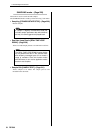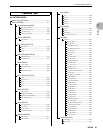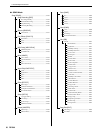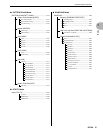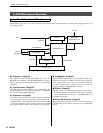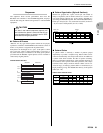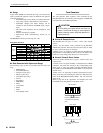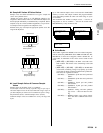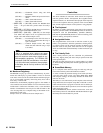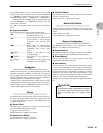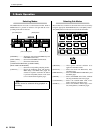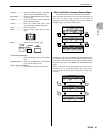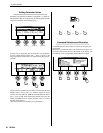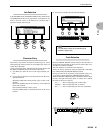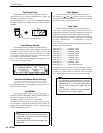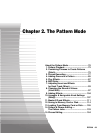
2. RS7000 Internal Structure
62 RS7000
(063 004)..........Cls&Wind: Classic string and wind
instruments.
(063 005)..........Eth&Perc: Ethnic and percussion instru-
ments.
(063 006)..........SFX1: Sound effect bank 1.
(063 009)..........SFX2: Sound effect bank 2.
• (MSB LSB) = (126 000) contains the RS7000 drum
voices — all up-to-date and a perfect match for today’s
music.
• (MSB LSB) = (127 000) is the GM drum voice bank con-
taining a single standard GM drum kit voice.
• (MSB LSB) = (064 000) ~ (064 001) are the sample
voice banks. The sample voices are organized into local
sample voices and common sample voices.
(064 000)..........Local Sample Voices: All 128 voices in
the bank are switched when the song or
style is switched.
(064 001)..........Common Sample Voices: The voices
remain the same when the song or style
is switched.
● Maximum Polyphony
The RS7000 can play up to 62 notes simultaneously. If perfor-
mance data which plays a greater number of notes is received
some notes will be cut off. Be careful that the maximum polyph-
ony is not exceeded, especially when using many notes with a
slow decay or release time.
Furthermore, the maximum polyphony applies to the number of
voice elements used, not the number of voices. The normal voices
include both 1-element and 2-element voices, so the maximum
number of simultaneous notes may be less than 62. Refer to the
voice list (Page 291) for a complete listing of the number of ele-
ments used by each voice.
Sample voices use 1 element, but stereo samples use 2.
Controllers
This block includes all controllers which control the sequencer
and tone generator blocks: the keyboard, the assignable knobs,
sequencer buttons, etc. Performance data played on the keyboard
is sent to the sequencer and tone generator in the form of MIDI
data, and the sequencer buttons control pattern or song playback.
● The Keyboard
In addition to sending performance (note) data to the sequencer
and tone generator blocks, the RS7000 keyboard can be used in
conjunction with the [KEYBOARD], [TRACK SELECT],
[MUTE] and [TRANSPOSE] buttons for section switching, track
selection, muting, transposition, and more.
● Assignable Knobs
The assignable knobs can be used for real-time control of play
effects, voice parameters, and mixer parameters, allowing hands-
on creative control over the sound in real time. In addition to the
functions listed on the panel, other functions can be assigned
which are memorized and automatically recalled with each style
or song.
● The Velocity Pads
These velocity-sensitive pads are convenient for performance
data entry. Tapping these pads enters the pre-specified note data
at the specified pitch.
The pitch for each pad can be set by pressing [PAD 1] or [PAD
2] while holding the [TAP] button and the appropriate key on the
keyboard.
● Scene/Mute Memory
Up to 5 complete scene and mute setups for each song and style
can stored in memory and recalled whenever needed.
A “scene” includes all parameter settings for all tracks (all mixer,
voice edit, mute on/off, groove, play effect, MIDI delay, BPM
and transpose settings). A mute setup includes the mute on/off
status for all tracks.
The ability to store and instantly recall complete scene and mute
setups means that even complex setups that would take a consid-
erable amount of time to program in real time can be called up at
the touch of a button. Recall operations can be recorded to pattern
chains and songs as well.
The [SCENE/MUTE] button switches between the scene and
mute memory functions. The SCENE and MUTE indicators light
alternately each time the button is pressed.
NOTE
*GM is a standard which assigns the same
voices to the same voices numbers so that MIDI
data will sound the same when played on any
GM-compatible equipment. The RS7000 GM
voice bank (000 000) and GM drum voice bank
(127 000) have been provided to allow playback
of GM data, but do not fully conform to the GM
standard.



